Decolonising the Mind Assignment
23 Pages5952 Words49 Views
Added on 2021-04-17
Decolonising the Mind Assignment
Added on 2021-04-17
ShareRelated Documents
Running head: DECOLONIZING OF MIND“The fundamental problem for thinking about post development is de-colonising your ownmind.” DiscussDecolonizing of MindName of the StudentName of the UniversityAuthor Note
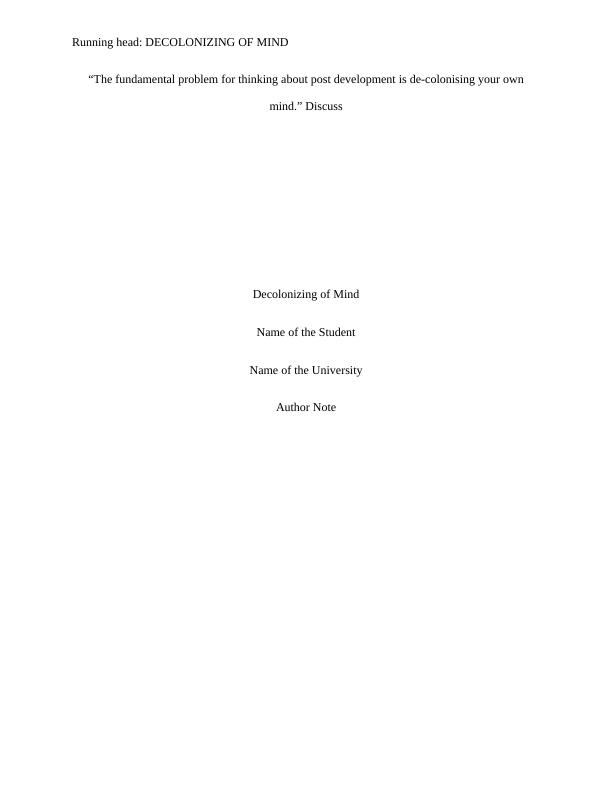
1DECOLONIZING OF MINDIntroductionIn the post-colonial scenario, the decolonization of the mind takes into account thefreedom of the mind form the shackles of the long imbibed colonist ideologies. One of the majorquestions portrayed by the postcolonial thinking is the relativism of the identity of the humanmind. The identity is one of the most important question of the post-colonial studies. Theidentification of self by a person in a given sense of identity or within a certain ideology is one ofthe major causes relating to different states of being of the human mind. The idea of beingcolonized or being under the influence of the foreign ideology is a subjective perspective basedin the fact that the overall ideology of the person identifying himself with the varioussociological aspects in the country. The different sociological factors are affected by the differentideologies of the person being affected in the different aspects in the society. The political andthe social scenarios affect the overall thinking of the human mind. The various aspects of themind is affected by the different ideological apparatuses. The mind is deeply accultured in the society due to the number of changes that have beenaffected or influenced by a number of socio economic factors of the society. The economy of thecountry or a society depends of the various factors that affect the psyche of the people in contextto their acculturating within the society. The definition of the various sociological aspects variesalong with the society. For example, poverty is a very subjective opinion of the individualcorrelated to the society they live in. The different aspects of the society that the individualresides in is affected by the different aspects of the socio cultural and the economic scenariomaking a situation where the concept of poverty depends among societies. The different aspectsof the society varying between the different individualistic perspectives shows the variance in the
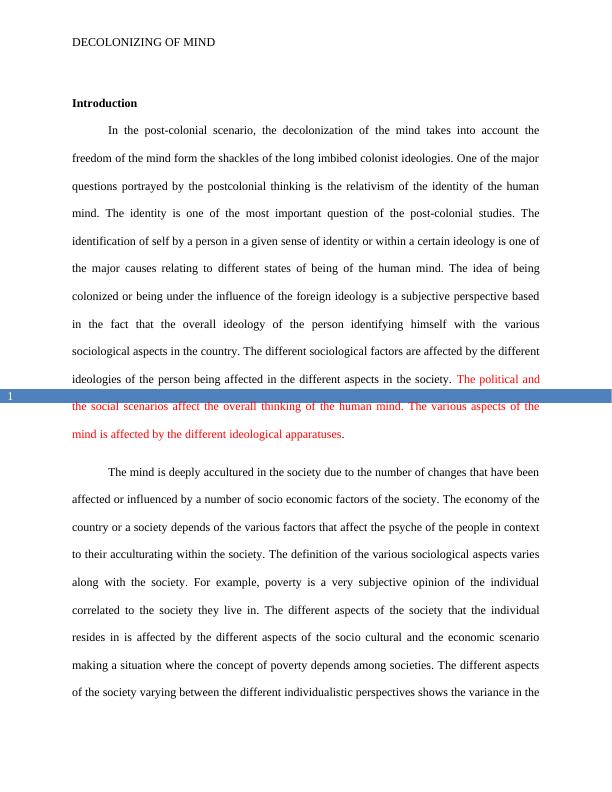
2DECOLONIZING OF MINDideological differences related to the different perspectives of the human mind such as povertyand economic instability. What may be considered to be poor in one country may not be thesame in another. Hence, the ideology of poverty is extremely subjective and dependent on thedifferent sociological factors.Development and Post DevelopmentDevelopment and Post development are the two theories to understand the differentchanges in the society needed for the achievement of the sustainable development in the society.The Development theoryis the understanding of a set of theories to understand the best ways toachieve desirable outcomes from the society. They are based on the sociological understandingsof the best ways to understand the changes taking place in the society. The different theories ofdevelopment include modernization and structuralism1. The Post Development Theories studythe different aspects of the various changes in the development theory to ascertain a number ofchanges needed in the society from an ecological and economic perspective. The postdevelopmental theory takes into account the developmental theory in the light of the political andthe ecological scenarios. The ecological and the socio-political development takes into account anumber of different aspects of society and environment. Jason Moore’s view of ecology is basedon the different aspects of ecology and the importance of the influence of capitalism on theenvironment. The different aspects of the capitalistic society affect the different social and thecultural differences leading to the different problems in the environment. In short, in the1 The Making and Unmaking of the Third World through Development - Arturo Escobar/ Development as Plannedpoverty - Ivan Illich. Both in: The Post-Development Reader (London: Zed Books, 1997), edited by Majid Rahnemawith Victoria Bawtree
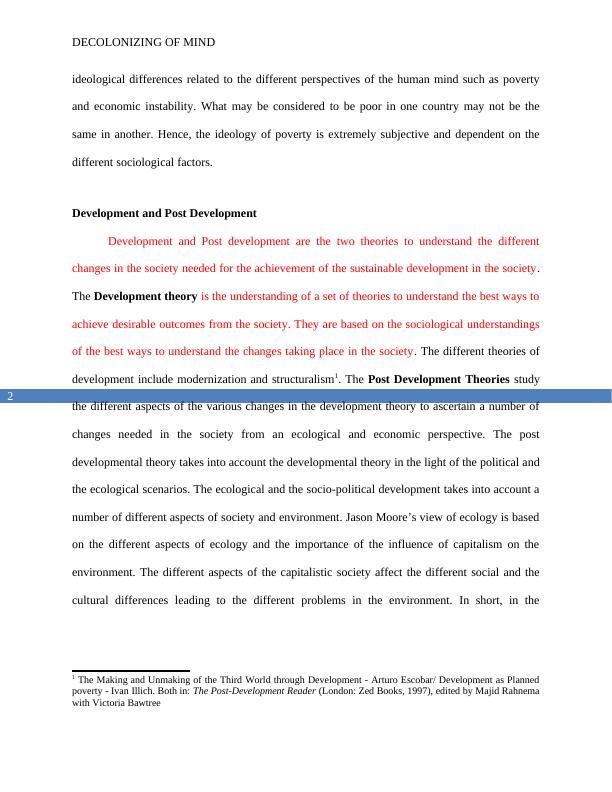
3DECOLONIZING OF MINDcapitalistic society the extra focus on the economic development leads to lack in the focus onecological sustainability2. Ilich’s planned poverty is a topic that delves on the support given by the developedeconomies to the developing economies. In turn, they forget to focus on the poverty issues withintheir country leading to state or poverty known as planned poverty. The different aspects of theplanned poverty focus on the various aspects of the socio-cultural aspects of the poverty3.Escobar’s unmaking of the third world takes into perspective the third world societies of theworld and attributes it to the inequality based on the different factors in the society. Unmakingthe third world means to go over this divide of inequality and ascertain a balance between thedifferent parts of the society. Inclusive Growth is the general term for the overall economicopportunities being provided to all the people in the society irrespective of their background. Thedifferent aspects of the development in the inclusive growth depends on the inclusion of all theclasses in the society into the environmental growth paradigm4.The Great TransformationThe investigation of how economies are initiated should begin, as indicated by Polanyi,from how the economy obtains solidarity and soundness, i.e., how the association and repeat ofits parts come to be secured5. He concentrated in such manner on fundamental auxiliary rules thatmay give such solidarity and security as opposed to on conceivable key or rambling wellsprings2 Jason W Moore, Capitalism in the Web of Life (London: Verso, 2015), pp.1-74. 3 Benjamin Selwyn, The Global Development Crisis (London: Polity, 2014), Chapters1 and 2 4 Alfredo Saad-Filho, Growth, Poverty and Inequality: From Washington Consensus to Inclusive Growth athttp://www.un.org/esa/desa/papers/2010/wp100_2010.pdf5Polanyi M, Society, Economics, And Philosophy (Routledge 2017)
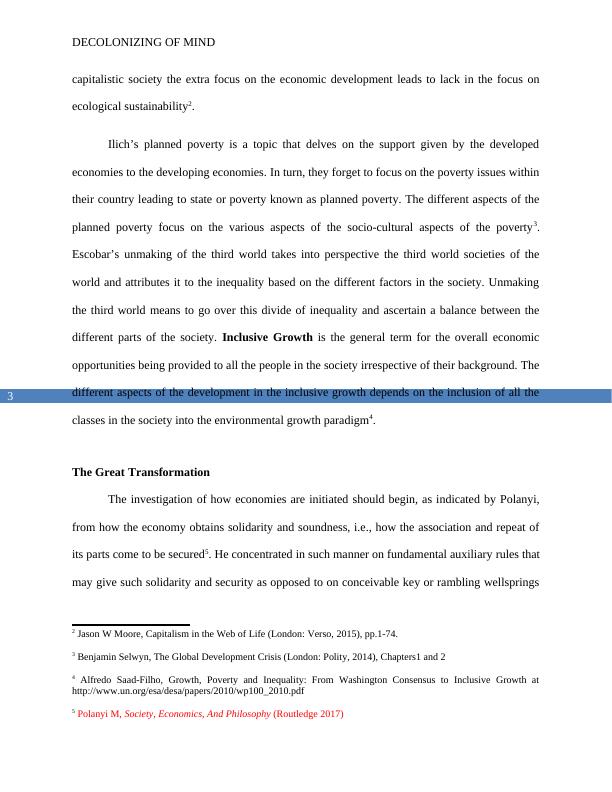
4DECOLONIZING OF MINDof reconciliation6. Also, given his enthusiasm for both installed and disembedded economies, heconcentrated on the prevailing guideline of dispersion of 'need fulfilling material means'. Polanyidistinguished three such standards related with socially installed economies. Firstly, thesymmetry of correspondence among comparably orchestrated or composed groupings (example:segmented connection gatherings). Secondly the group of people with centralized administrativeresponsibilities for social welfare. The last is the group of house holding in view of generationfor one's own needs in a to a great extent independent unit, for example, the family, settlement,or estate . These standards can be appeared differently in relation to the turmoil of trade bymeans of value making markets in a disembedded and conceivably automatic economy. Nogeneral public can exist without an arrangement or some likeness thereof which guaranteesarrange in the generation and conveyance of products7. In any case, that does not suggest the presence of particular financial foundations;typically, the monetary request is simply a component of the social request. Nineteenth-centurysociety, in which financial movement was detached and attributed to a particular monetarythought process, was a solitary take-off. The dissociation of the economy from the market size isknown as economistic fallacy8. NEF’s The Great Transition greatly echoed of the ideas ofPolayni and its implications in the modern context and their achievability considering thedifferent aspects of the society. The idea is the use of the environmental resources sustainably in6 Karl Polanyi, The Economistic Fallacy, Review (Fernand Braudel Center), Vol. 1, No. 1 (Summer, 1977), pp. 9-187 Chris Hahn and Keith Hart, Unequal Development, from Economic Anthropology (London: Polity, 2011). 8 David Barkin, Wealth, Poverty and Sustainable Development at https://books.google.co.uk/books?hl=en&lr=&id=CwEe9SVExsEC&oi=fnd&pg=PA77&dq=poverty+and+sustainable+development&ots=rK7pIETTIf&sig=bbRHewXpuBUKZHnnhuz1nInZUsM#v=onepage&q=poverty%20and%20sustainable%20development&f=false
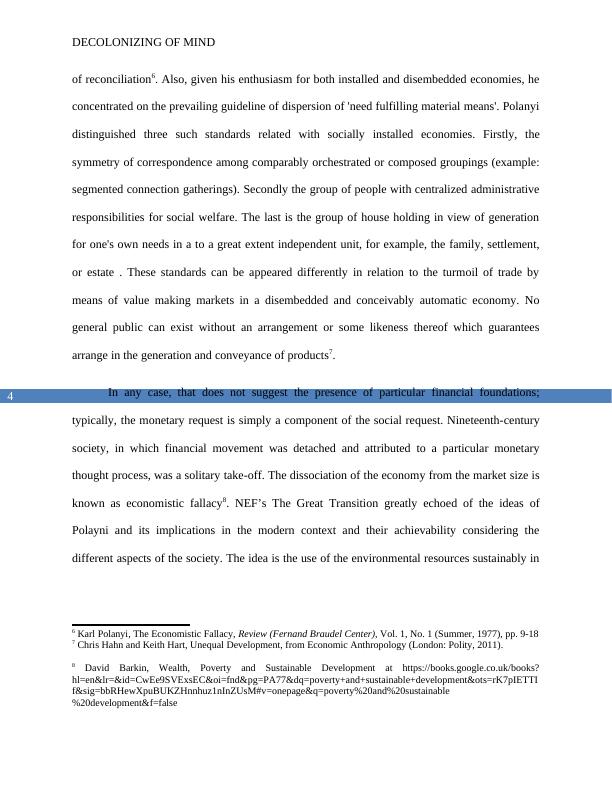
5DECOLONIZING OF MINDthe modern environment. The theory of Polayni greatly takes into account the different aspects ofthe sustainable economic development of the different aspects of the society9.Human Rights, Capacity and PovertyOpportunity, Sen says, is a standard determinant of individual activity and socialviability; it is great principally on the grounds that it upgrades the capacity of people to helpthemselves. This is a property that Sen depicts as the 'organization aspect' of the individual.Social capacities are result of the cohesion of singular ones which according to Sen are buildingblocks of economy. It is just to brace singular flexibilities that might be smothered by defects ofprivate enterprise that emerge from wrong-went to advancement10. In reverberating the politicalfinancial expert Adam Smith, Sen sees social organizations as having a constrained part as onecannot supplant singular obligation by social direction: 'there is not a viable alternative forsingular duty'. Joblessness is terrible due to its 'expansive weakening consequences for singularflexibility, activity, and abilities'. The core of Nussbaum's liberal hypothesis of equity and humanrights is Amartya Sen's idea of generous opportunities or capacities. Before making astutestatements about just disseminations, one needs to settle on a measurement whose relativeesteem is imperative. In connection to human advancement, particularly, neediness, the inquiry is to knowunequivocally what we ought to choose to increase. Inclination utilitarianism is one of the strongmethodology used by the organizers today. This approach advocated the intention of socialorganizers to augment the fulfilment of inclinations that people have before connection of social9 See also The New Economics Foundation, The Great Transition, http://www.neweconomics.org/publications/entry/the-great-transition 10 Amartya Sen, The Ends and Means of Development and Poverty as Capability Deprivation, from Development asFreedom (Oxford: OUP, 1999).
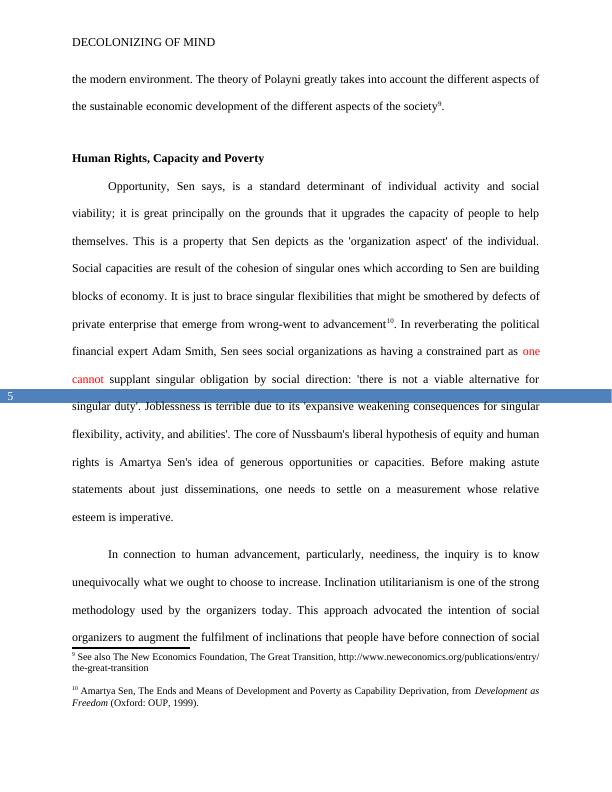
End of preview
Want to access all the pages? Upload your documents or become a member.
Related Documents
Symbols, Selves, and Social Reality | Sociology Assignmentlg...
|8
|2066
|26
Time in Plays of Chekhovlg...
|9
|2559
|121
Postcolonial Critique of Anthropologylg...
|6
|1376
|422
Summary of Readings on Indigenous Effects of Modernization, Importance of Craftwork, and Adoption of Indigenous Thinkinglg...
|8
|2241
|397
Speculative Futures: Indigenous Futurism in Film, Art, and Literaturelg...
|5
|1203
|423
Psychology Assignment Solution (Doc)lg...
|11
|2860
|288
